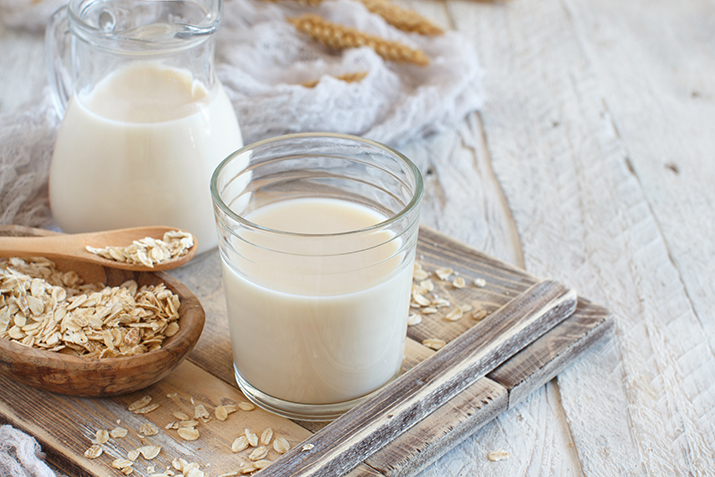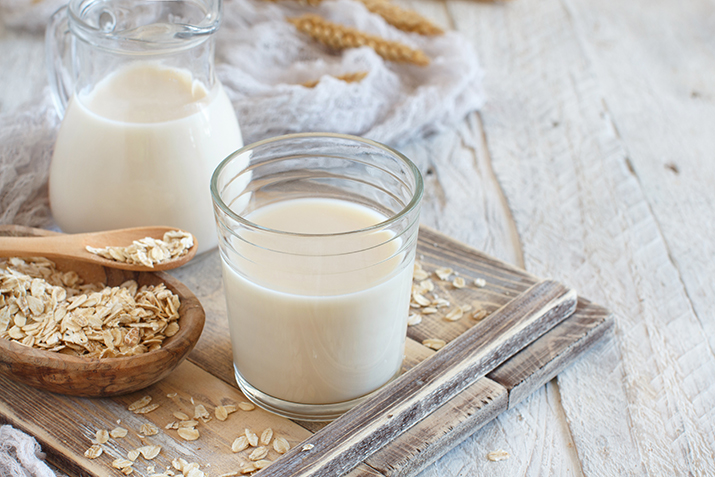Sales of oat milk overtake almond in the UK


Vegan oat milk, non dairy alternative milk in a glass close up
Oat milk has quickly become the plant-based milk of choice, according to the latest research from Mintel, as sales of the trendy, non-dairy substitute almost doubled between 2019-20. Brits spent a hearty £146 million on oat milk in 2020, up from £74 million in 2019. By contrast, consumers spent £105 million on almond milk in 2020 compared to £96 million in 2019, resulting in oat overtaking almond to become the nation’s number one selling vegan milk. This comes as total spend on plant-based milk* reached £394 million in 2020, increasing 32% from 2019 when it was worth £298 million. Meanwhile, sales of cow’s milk reached £3.2 billion in 2020.
A record one in three Brits now drink plant-based milk** with usage up from 25% in 2020 to 32% in 2021, and almost 44% of Brits aged 25-44 are plant-based milk users. Usage of standard cow’s milk continues to be lower amongst younger consumers, dropping to 84% of 16-24s compared to 96% of those aged 65+.
Almost a quarter (23%) of adults agree that plant-based milk is better for them than cow’s milk, while half (50%) of adults agree people’s milk choices make a difference to the environment. Overall, a quarter (26%) of adults agree the Covid-19 outbreak has made vegan/plant-based food and drink more appealing to them, rising to 38% of under-35s.
Amy Price, senior food and drink analyst, Mintel, said: “The plant-based trend continues to gain momentum in the UK, fuelled by environmental and health considerations. Almost a third of adults drink plant-based milk, evidence of its firmly mainstream status and appeal far beyond the vegan or vegetarian populations.
“Oat milk was the main beneficiary of the accelerated demand in plant-based milk during 2020, overtaking almond milk as the top-selling plant-based milk. Oat milk’s previous robust growth has attracted a lot of innovation to the segment including barista-style varieties. The rapid sales growth of plant-based milk has brought about new product development from established players and new entrants alike.
“While almost ninety percent of Brits use cow’s milk, usage continues to be lower amongst younger Brits than older age groups, as it faces intense competition from plant-based varieties. If they retain their plant-based milk habit as they age, this stands to drive usage across the population upwards over time, fuelling long-term growth for the plant-based milk category.”
Filtered milk success
Filtered milk***, which stays fresher longer than standard milk, has proved to be a star performer during the past year. Sales of filtered cow’s milk increased an impressive 32% between 2019-20 to reach £244 million and as many as one in seven (14%) Brits are now users of this milk**** up from 9% a year ago. UHT milk has also seen a surge in usage, up from 14% in 2020 to 20% in 2021. Overall, chilled milk***** remains the nation’s favourite milk format with usage standing at 92% of Brits.
“Filtered milk has benefited hugely as people’s shopping habits changed during the pandemic. A tendency to shop less often meant more people were willing to pay for milk that stayed fresh for longer. The pivotal question for longer-life milk options is whether more frequent shopping habits will resume even as a permanent shift towards more homeworking is predicted. If commuting levels increase, then top-up shopping should be boosted – potentially making fresh milk more appealing and filtered milk less so,” said Price.
Clotted cream
Finally, in the year that Brits flocked to the West Country for their staycations, Mintel reveals that usage of the Cornish and Devon favourite clotted cream almost doubled from 6% in 2020 to 11% in 2021. Covid-19 ignited the nation’s love of cream as Brits’ usage of cream also rose from around half (51%) of the population in 2020 to almost seven in 10 (68%) in 2021.
Price commented: “Clotted cream has benefited from Brits spending more time in the home, including enjoying more afternoon teas and the rise in cooking and baking.”
Related content
Source: foodanddrinktechnology.com

